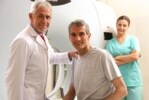Lung Cancer Screening Program
Lung cancer causes more deaths in the United States than any other type of cancer. This is because lung cancer is most often diagnosed in the later stages after the disease has progressed; early stage lung cancer does not show any symptoms.

Worried you are at risk for lung cancer?
Call 320-240-7867 or contact your provider to discuss your next steps.
The results of the National Lung Cancer Screening Trial (NLST) showed that lung cancer screening for patients who are at high risk can find cancer at an early stage, and help prevent one in five deaths from lung cancer.
CentraCare Lung Cancer Screening Program offers lung cancer screening for individuals at high-risk of lung cancer. The goal of the screening is to detect cancer early, when it is likely more treatable.
As a comprehensive healthcare organization, CentraCare offers expertise in pulmonary medicine, radiology, surgery and oncology. Skilled specialists are available to guide patients through every step of the lung cancer screening including prevention, screening, diagnosis and treatment.
About the Screening
Who should be screened?
Qualification Criteria:
- Between the ages of 55 and 77
- Asymptomatic
- Currently a smoker or has quit smoking within the past 15 years
- Has smoked a pack of cigarettes a day for at least 30 years
- Has not had a CT scan of the chest in the past 12 months
Cost of the screening
Screening is covered by most insurance plans. As each plan varies, please check with your insurance provider for coverage information. Follow-up for any abnormal findings usually is covered by most health plans. You can also check with CentraCare's Price Quote Line at 320-251-2700, ext. 53129.
About CT scans
CentraCare lung cancer screening CT scans will be completed at CentraCare Health Plaza.
Computed Tomography or CT is a diagnostic procedure where a scanner produces a detailed, computer-generated image of the body.
CT scans show the shape, size and location of organs and tissues for any part of the body. The scans are more sensitive and reliable in finding early lung cancers as compared to routine chest X-rays.
A low-dose CT scan has about 20 percent of the radiation dose of a standard dose CT scan.
What to Expect from the Program
Schedule a screening
Talk with your provider if you meet the qualification criteria. You can expect an office visit with your provider to review the risks and benefits of screening and follow-up diagnostic testing. After this is complete, the Radiology department will review and confirm qualification criteria is met and will contact you to schedule the screening.
For questions regarding lung cancer screening, please call the Pulmonary Medicine nurse at 320-240-7867.
Lung cancer screening
The Lung Cancer Screening Program uses low-dose computed tomography (CT) scans to find lung cancer early in current or former smokers, when it is likely more treatable.
- The CT procedure is painless and quick. No drugs or injections are used.
- You will lie on a table which slides through the CT scanner. The complete procedure will take about 5 minutes.
- After your scan, your provider will review the CT and call you to discuss the results.
Risks of the screening
- Screening programs don't always find cancer early enough to be cured.
- Some people get treated even though the cancer grows so slowly that it won't cause death.
- Some people get unneeded tests, treatment or both because screening results were unclear or wrong.
There is a small chance of getting cancer from being exposed to radiation. A low-dose CT scan uses more radiation than a regular chest X-ray. However, it uses much less than a regular-dose CT scan. You and your provider will decide if the possibility of finding lung cancer early is worth the risk of having this test.
Talk to your provider about the risks and benefits of screening before getting the test.
Treatment and follow-up
Follow-up and additional testing
Normal results
If the scan is normal, you will repeat the low-dose CT scan in 12 months.
Abnormal results
If a nodule* is detected, closer follow-up or additional testing may be required.
*A lung nodule is a round or oval-shaped mass in the lungs. While lung nodules often can go unnoticed for years, they may need to be watched. The nodules are not usually cancerous and could be the result of old scars or infection. In some cases, nodules can be an early stage cancer and should not be ignored.
Early Stage Lung Cancer Treatment
If you are diagnosed with lung cancer, CentraCare Health has experts in all areas of lung cancer treatment to ensure that you get the best possible management.
Early stage lung cancer can often be cured with surgical removal. Our surgeons are skilled in the latest techniques for removing lung cancer. Our cancer experts at Coborn Cancer Center offer the most innovative treatments for radiation therapy to target only the cancerous cells. We will work with you to develop a personalized treatment plan.
Click the link for more information about Coborn Cancer Center.
Resources
Tobacco Treatment Programs